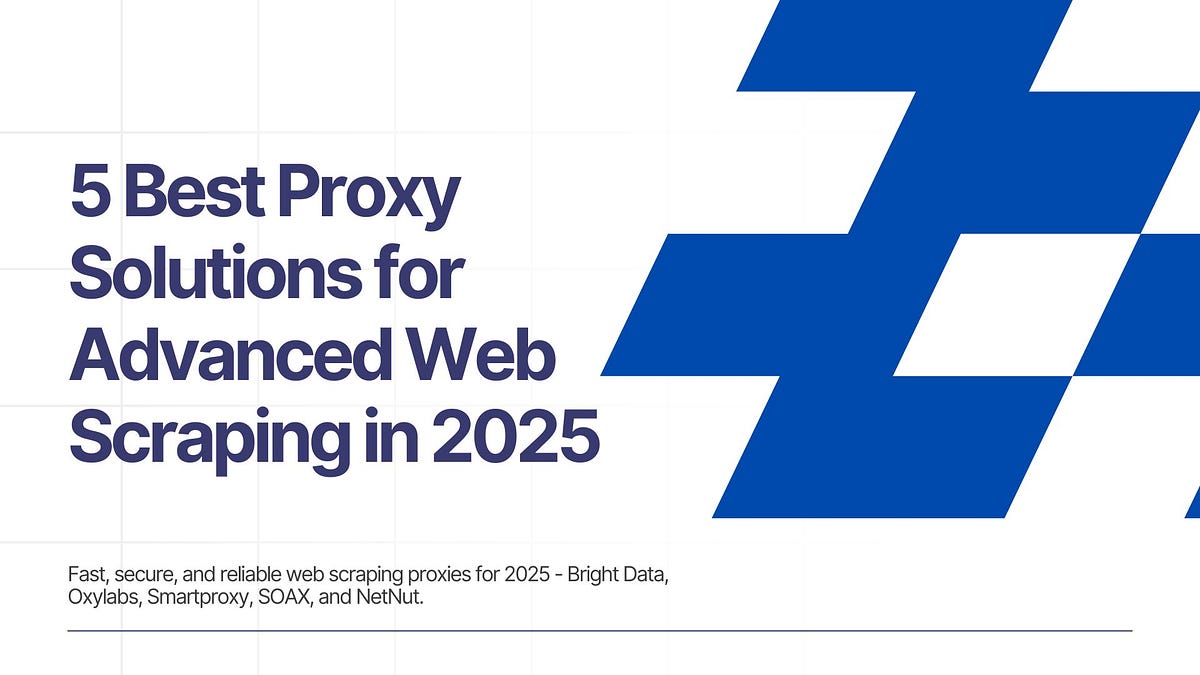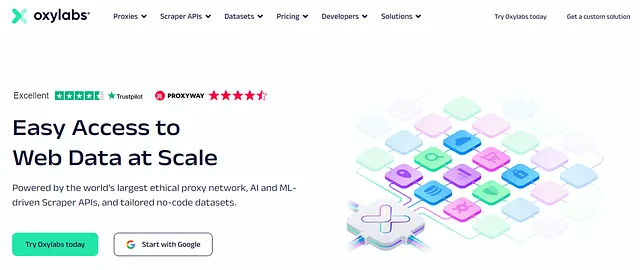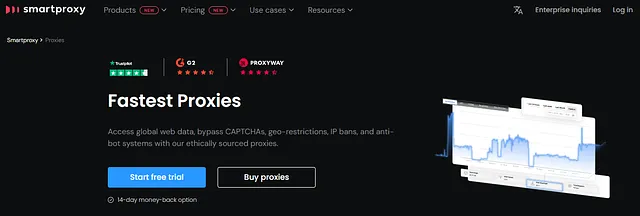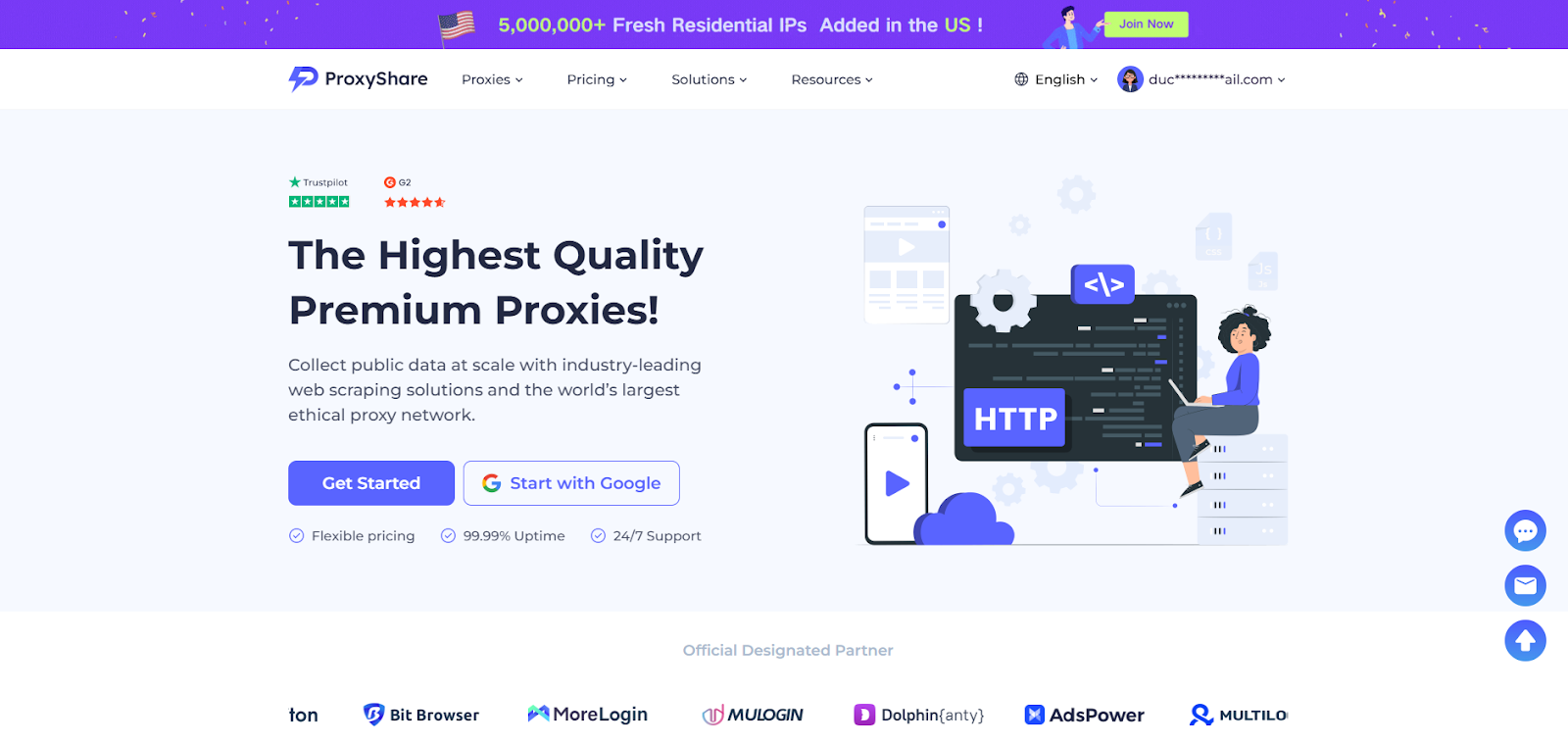
5 Best Proxy Solutions for Advanced Web Scraping in 2025
1. Bright Data, 2. Oxylabs, 3. Smartproxy, 4. SOAX, and 5. ProxyShare — fast, secure, and reliable web scraping proxies for 2025
Introduction
Are you unable to scale your scraping operations? With websites deploying strict anti-scraping or blocking measures, automated data collection is becoming nearly impossible.
The best way to mitigate this is by using reliable and legally compliant proxy solutions that can bypass these blocking mechanisms.
In this article, you’ll explore five reliable proxy solutions for your web scraping needs, ensuring a fast, secure, and scalable data collection process.
Before diving into the list, let’s first briefly take a look at the different blocking or anti-scraping mechanisms employed by websites.
What are some Common Blocking or Anti-Scraping Measures?
To prevent automated web scraping, websites employ various techniques such as CAPTCHAs, IP blocking, rate limiting, user-agent detection, JavaScript challenges, honeypot traps, and device fingerprinting.
With these blocks in place, large-scale scraping becomes nearly impossible. And this is where proxies and residential proxies come in.
In the following section, we’ll briefly explore why proxies are needed for web scraping.
Why Are Proxies Needed for Web Scraping?
To understand why proxies are important for web scraping, let’s take a look at the benefits they offer:
- Solve CAPTCHAs: Rotating proxies reduce CAPTCHA triggers, ensuring uninterrupted scraping.
- Avoid IP bans: Proxies rotate IPs to prevent website blocks from too many requests.
- Maintain anonymity: Proxies hide your real IP to keep your identity and location private.
- Bypass detection: Proxies help bypass fingerprinting and tracking methods used by websites.
- Bypass geo-restrictions: Proxies allow access to region-specific content by masking your location.
What Are the Different Types of Proxies for Scraping?
Here’s a breakdown of the most common types of proxies, along with their pros and cons:
A comparison of the different types of proxies used in web scraping
Selecting the right proxy type is crucial for successful web scraping. Each type offers distinct advantages and disadvantages, depending on your goals and the website’s defenses.
TL;DR
Take a look at this abridged version if you’re short on time (a detailed breakdown can be found below):
- Bright Data: Extensive proxy network, global coverage, granular targeting, flexible pricing; ideal for both large and small-scale scraping.
- Oxylabs: Extensive network, global coverage, premium features; best for enterprises, costly for individual users.
- Smartproxy: Affordable with fast IP rotation; lacks advanced targeting, but scales well.
- SOAX: Large proxy network, precise geo-targeting; limits concurrent requests at lower tiers.
- ProxyShare: Extensive Network:75M+ residential IPs in 195+ locations (e.g., US, Canada, Germany).
Top 5 Proxies for Web Scraping
1. Bright Data

Bright Data leads the pack with a massive proxy pool of over 72 million IPs, offering unbeatable customizations, reliability, and uptime. Whether you need rotating residential proxies, static residential proxies, resilient mobile proxies, or datacenter proxies Bright Data provides all, including 24/7 global support.
👉 Check out Bright Data’s proxy products here:
Proxy Services - Residential, Datacenter, Mobile, and ISP Proxies
They offer high-quality proxies that are ethically sourced (with a rigorous compliance process) and adhere to major data protection regulations like the GDPR and CCPA, ensuring your scraping operations don’t get flagged by target domains. And their advanced location-based targeting options, including ZIP and ASN-level filtering, give you fine-grained control and ensure a high level of accuracy.
Bright Data utilizes its robust infrastructure to provide a suite of tools designed to maximize its effectiveness. This includes a comprehensive API, a browser extension, and an open-source proxy management tool.
Bright Data’s Proxy Manager can be installed on Windows, macOS, and Linux. Using the Proxy Manager, you can easily set rotation options (whether per request or session), blacklist underperforming IPs, and optimize bandwidth. Bright Data’s proxy infrastructure also supports HTTP, HTTPS, and SOCKS5 protocols, ensuring speed, security, and scalability.
👉 Learn more about the Proxy Manager here:
Get Started with Proxy ManagerGet started with Bright Data's Proxy Manager
Besides a vast and widespread network of high-quality proxies, Bright Data also offers a Web Unlocker that offers AI-powered website unlocking, automated proxy management, and a built-in browser for JavaScript rendering, guaranteeing near-perfect success rates making it a top choice for businesses with large-scale scraping requirements.
👉 Learn more about the Web Unlocker here:
Quick Start Guide for Bright Data's Web Unlocker - Bright Data Docs
When it comes to pricing, Bright Data provides flexible pricing plans with pay-as-you-go options and a free trial period of 7 ays.
💡 Presently Bright Data is offering to match up to $500 of your first deposit if you buy any of its proxies.*��* Learn more about pricing and offers here:
Buy Proxies: Know the latest offers
Key Features of Bright Data’s Proxy Services:
- A proxy pool of 72+ million IPs.
- Proxy network spread across 195+ countries.
- Country, state, city, ZIP, ASN-level targeting with access to real-peer IPs.
- Rotating and static proxy options for flexible use cases.
- 99.99% network uptime, ensuring high reliability.
- Real-time network status page.
- Support for HTTP, HTTPS, and SOCKS5 protocols.
- Session control for maintaining long or short proxy sessions.
- GDPR & CCPA compliance.
- Integration through API, browser extension, and proxy manager.
- Web Unlocker for guaranteed access to even complex websites.
- 24/7 customer support.
- Extensive documentation.
- Unrestricted simultaneous requests.
Pricing Plans:
- Residential Proxies: Starting from $8.4/GB (pay-as-you-go) with prices going down as you scale up.
- Datacenter Proxies: Starting from $0.6/GB (pay-as-you-go) with prices going down as you scale up.
- ISP Proxies: Starting from $18.75/GB (pay-as-you-go) with prices going down as you scale up.
- Mobile Proxies: Starting from $8.4/GB (pay-as-you-go) with prices going down as you scale up.
Free Trial: 7-day free trial.
👉 Start your free trial now:
Buy Proxies: Free Trial — No Credit Card Required
Pros:
- Huge proxy network covering almost every country
- Highly customizable and comes with a lot of options.
- Advanced targeting that lets you filter by country, city, ZIP code, and ASN.
- 99.99% network uptime, ensuring a highly reliable service.
- Easy-to-use proxy manager, user-friendly dashboard, and API.
- Supports SOCKS5 protocol.
- Ethically compliant.
- Flexible pricing plans, offering pay-as-you-go options on top of a free trial.
- 24/7 customer support.
- Extensive documentation, tutorials, guides, videos, and webinars to help users.
Cons:
- Could get costly with more customizations.
- Involves a learning curve.
2. Oxylabs

Oxylabs
Oxylabs offers a robust proxy network with 100 million residential IPs, providing extensive global coverage and targeting options by country, city, or ASN. Their rotating residential proxies ensure fresh IPs with every request, reducing the risk of blocks, while static residential proxies sourced directly from ISPs offer non-rotating IPs for added stability. Both types support SOCKS5, giving developers greater flexibility.
Oxylabs also stands out with its next-gen residential proxies, which leverage AI to mimic real user behavior, making them especially effective at avoiding CAPTCHAs and detection.
Though priced at a premium, Oxylabs is ideal for businesses that need reliable, high-performance proxies for large-scale scraping projects.
Key Features of Oxylabs’ Proxy Services:
- A proxy pool for 100+ million IPs.
- Proxy network spread across 195 countries.
- HTTP and HTTPS protocols supported
- Advanced targeting that lets you filter by country, city, ZIP code, and ASN.
- No limit on concurrent requests
- IP rotation with every request, with the option for sticky sessions of up to 30 minutes
- Whitelisted IPs and user/password authentication are available
- Public API provided for ease of proxy user management
- Detailed documentation available
- 24/7 live support and a dedicated account manager for assistance
Pricing Plans:
- Residential Proxies: Starting from $8/GB (pay-as-you-go) with prices going down as you scale up.
- Datacenter Proxies: Starting from $0.65/GB (for 77 GB monthly traffic) with prices going down as you scale up.
- ISP Proxies: Starting from $21.00/month (for 10 proxies) with prices going down as you scale up.
- Mobile Proxies: Starting from $9/GB (pay-as-you-go) with prices going down as you scale up.
Free Trial: 7-day free trial for verified enterprise accounts.
Pros:
- Large proxy pool (100M+ residential, 2M+ datacenter IPs)
- Precise targeting (country, city, ASN)
- Rotating and static options
- AI-powered to bypass CAPTCHAs
- High reliability and speed
- GDPR & CCPA compliance
Cons:
- Premium pricing
- Requires manual setup for some targeting features
3. Smartproxy

Smartproxy
Smartproxy offers a solid proxy network with over 65 million rotating residential IPs from desktop and mobile devices, along with data center proxies. While IPs are shared, their fast rotation policy helps avoid bans, and users can run unlimited concurrent threads.
Smartproxy’s intuitive dashboard allows easy proxy filtering by location and session type, and browser extensions for Chrome and Firefox simplify browsing. With a near-perfect success rate and fast response times, Smartproxy delivers quality performance.
As for pricing, Smartproxy offers a more affordable solution compared to the premium providers. However, its features and targeting options come up short when compared to premium providers.
Key Features of Smartproxy’s Proxy Services:
- A proxy pool of over 65 million IPs.
- Proxy network spread across 195 locations with country and city-level targeting
- Rotation every request with optional session lengths of 10 or 30 minutes
- Unlimited concurrent connections
- Whitelisted IP and username/password authentication options
- Access to API and browser extensions
- Extensive documentation
- 24/7 support services offered
Pricing Plans:
- Residential Proxies: Starting from $7/GB (pay-as-you-go) with prices going down as you scale up.
- Datacenter Proxies: Starting from $0.60/GB (for 50 GB monthly traffic) with prices going down as you scale up.
- ISP Proxies: Starting from $35.00/month (for 10 proxies) with prices going down as you scale up.
- Mobile Proxies: Starting from $8/GB (pay-as-you-go) with prices going down as you scale up.
Free Trial: 3-day free trial for residential proxies; 14-day money-back guarantee for the rest.
Pros:
- Large residential pool (65M+ IPs)
- Quick IP rotation reduces bans
- Unlimited concurrent threads
- Easy proxy filtering via dashboard
- Browser extensions for convenience
- Strong performance with fast response times
Cons:
- Shared IPs may be flagged
- Limited features compared to premium providers
- Fewer advanced targeting options
4. SOAX

SOAX
SOAX offers a massive proxy pool of over 190 million residential and mobile IPs, emphasizing ethical sourcing and superior web scraping capabilities. With advanced geo-targeting options down to city and ASN levels, SOAX provides precise data collection, ideal for you if your use cases include market research, SEO monitoring, and ad verification. With their rotating proxies, you’ll be able to minimize detection, while their sticky sessions will provide much-needed stability when required.
The SOAX dashboard is highly intuitive, letting you manage proxies seamlessly, and their Web Unblocker will help simplify scraping on dynamic sites.
Though SOAX positions itself as a premium proxy solution, the combination of advanced filtering, seamless IP rotation, and responsive customer support makes it a go-to choice for professionals seeking a reliable, scalable proxy network.
Key Features of SOAX’s Proxy Services:
- A proxy pool of over 190+ million IPs.
- Proxy network spread across 195 locations with country and city-level targeting.
- Geo-targeting at country, city, region, and ASN levels.
- IP rotation with customizable sticky sessions.
- SOCKS5 and HTTP(S) protocols are supported.
- High uptime with fast, secure connections.
- Web Unblocker for complex sites.
- 24/7 customer support via live chat.
Pricing Plans:
- Residential Proxies: Starting from $6.60/GB (for 15 GB monthly traffic) with prices going down as you scale up.
- Datacenter Proxies: Starting from $0.65/GB (for 75 GB monthly traffic) with prices going down as you scale up.
- ISP Proxies: Starting from $99.00/month (for 15 GB monthly traffic) with prices going down as you scale up.
- Mobile Proxies: Starting from $6.60/GB (for 15 GB monthly traffic) with prices going down as you scale up.
Free Trial: 3-day trial for $1.99 (providing 100 MB traffic).
Pros:
- Vast proxy pool (190M+)
- Detailed geo-targeting options
- Ethical proxy sourcing
- Intuitive dashboard
- Reliable, high-speed connections
Cons:
- Higher price point
- Concurrent session limits on lower-tier plans
- No free trial
5. ProxyShare
ProxyShare is a leading provider of residential and SOCKS5 proxy services, boasting an ethically sourced proxy network with over 75 million residential IPs across 195+ countries and cities. It caters to businesses and developers globally for tasks like web scraping, market research, and ad verification.
Key Features
- Extensive Network:75M+ residential IPs in 195+ locations (e.g., US, Canada, Germany).
- High Reliability: Up to 99.9% uptime with static residential proxies for stable connections.
- Flexible Types: Rotating/static residential proxies, unlimited residential proxies, static data center proxies, and long-acting ISP proxies.
- User-Friendly Dashboard: Easy management of settings (IP list check, rotation, geolocation change, etc.).
- Global Coverage: Proxies in Europe, Asia, Americas, Africa for localized content access.
- Secure Browsing: Real user device-powered proxies reduce CAPTCHAs/IP bans, ensuring anonymity.
- 24/7 Support: Round-the-clock assistance from the dedicated team.
Advantages
- Ethically sourced IPs, compliant with legal and ethical standards.
- Comprehensive geo-targeting across 195+ locations.
- Reduced risk of IP bans/CAPTCHAs via real devices and rotation.
- Intuitive interface for users with limited technical skills.
- Flexible pricing (pay-as-you-go, subscriptions) for different needs/budgets.
Disadvantages
- Limited free trials, inconvenient for pre-purchase testing
- Potential IP overlap affecting IP uniqueness.
- Variable pricing based on proxy type/usage, a concern for budget users.
ProxyShare is reliable for global data gathering and secure browsing, with a vast ethical network, user-friendly tools, and strong support.
Honorable mention: NetNut

NetNut
NetNut delivers a reliable proxy network with over 85 million IPs, featuring rotating residential, and over 1 million static residential, mobile, and datacenter proxies. Their static residential IPs, sourced exclusively for users, ensure they haven’t been flagged by target domains. With 250K+ mobile IPs from top carriers, NetNut offers enhanced anonymity and the ability to bypass geo-restrictions.
Renowned for its fast response time and 99.99% uptime, NetNut is ideal for high-scale data extraction. While pricing varies by parameters, it offers flexible plans and a free trial for new users.
Key Features of NetNut’s Proxy Services:
- A proxy pool of over 85 million IPs.
- An impressive pool of over 1 million static IPs.
- Proxy network spread across 195 locations with country and city-level targeting.
- Cost-effective premium proxies for high-volume data collection.
- Seamless access with auto IP rotation.
- Round-the-clock availability with the option to keep sessions forever.
- Unrestricted simultaneous requests.
- Zero IP blocks or CAPTCHAs.
- Dedicated support with an account manager.
Pricing Plans:
- Residential Proxies: Starting from $6/GB (for 14 GB monthly traffic) with prices going down as you scale up.
- Datacenter Proxies: Starting from $0.90/GB (for 100 GB monthly traffic) with prices going down as you scale up.
- ISP Proxies: Starting from $84.00/month (for 7 GB of traffic) with prices going down as you scale up.
- Mobile Proxies: Starting from $6.46/GB (for 13 GB monthly traffic) with prices going down as you scale up.
Free Trial: 7-day free trial.
Pros:
- Large proxy pool with 85+ million residential IPs and 250K+ mobile IPs.
- Supports SOCKS5 protocol for improved privacy and bypassing restrictions.
- Fast response times and 99.99% uptime.
- Detailed usage stats, ideal for resellers.
Cons:
- Complicated setup process.
- Limited features in the dashboard; UI isn’t user-friendly.
- High starting cost.
- Pricing isn’t flexible as NetNut doesn’t provide any pay-as-you-go plans.
- Since reselling is allowed, some IPs might not have a great reputation.
What Are the Factors for Choosing Web Scraping Proxies?
Choosing the right proxy service for web scraping involves a few critical considerations such as:
- Anonymity and ability to resist getting blocked: The best proxies should hide your IP and not reveal themselves as proxies. Residential proxies are ideal for this since they mimic real users and are hard to detect.
- Access to local data: A good proxy network allows you to target local IPs from different cities or countries, facilitating access to region-specific content.
- Ease of use and customer support: Scraping can get technical, so reliable customer support is crucial. The best proxy providers offer clear setup instructions, extensive documentation, and tutorials for popular tools like Selenium or Puppeteer, or third-party scrapers and have knowledgeable support teams to assist you with complex configurations.
- Integration options: Choose a service that provides several integration options and integrates seamlessly with your scraping tools.
- Feature-rich service: The ideal proxy service for you offers features like IP whitelisting, rotation, and varied authentication options.
- Ethics and legal compliance: Ethical sourcing of proxies ensures you’re scraping responsibly, with reduced legal risks. The ideal proxy provider is compliant with data protection regulations like the GDPR and CCPA.
The ideal scraping solution would offer a perfect balance of all these factors.
Conclusion
To sum up, all the proxy services discussed above are ideal for almost all web scraping-related tasks.
That said, if you’re looking for the perfect mix of features, reliability, and security, Bright Data really stands out as the best all-around choice — especially for those who need an enterprise-grade solution. However, its flexible pricing plans can be attractive even for individual users.
However, before committing, you should take their free trial to see if it’s the right choice for you.
If you have a big requirement and budget is not a constraint then Oxylabs and SOAX could also be good options for you.
However, if you have serious budget restrictions, you can try Smartproxy, but be prepared to sacrifice some of the features and customization options that you’d get in the premium options like Bright Data or Oxylabs.
Ultimately, the decision depends on your use case and budget.
Some Frequently Asked Questions about Proxies
Are free proxies safe for web scraping?
Free proxies work best for one-time projects but for large-scale projects, they’re not ideal as they’re used extensively by multiple users and can thus quickly get a bad reputation. Free proxies might also not be secure.
How can I prevent IP bans when web scraping?
To prevent IP bans you should use quality proxies along with proper website unblocking tools (usually provided by the proxy seller itself). IP bans occur when you use one IP for your scraping projects for an extensive period. Quality proxies when rotated per session or per request, can help preserve your anonymity, preventing you from getting flagged or banned.
Which is better for web scraping — residential or datacenter proxies?
Depends on the scraping task and your budget.
For websites with strict blocking mechanisms and complex and dynamic layouts, residential proxies are ideal, as these are not easily detected and can get past most blocking mechanisms. However, these proxies come at a steep price.
For simpler websites, involving minimal blocks, datacenter proxies can do the trick. These proxies are generally faster but they can be easily detected by advanced websites. Learn more here.
